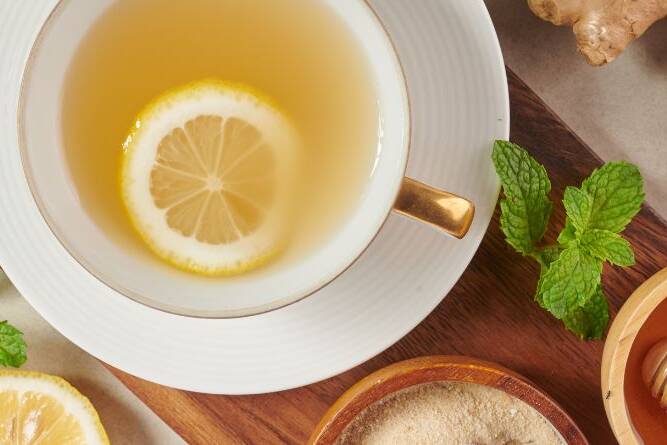For centuries, our grandmothers knew a thing or two about keeping our bodies strong.
In fact, they might as well have been health experts in disguise, using nothing but what they had in their kitchens! Whenever a sneeze, ache, or sniffle cropped up, they’d reach for jars of spices with ease, ready to brew a concoction that somehow worked wonders.
While they may not have degrees in nutrition, they sure had us covered with their kitchen medicine, making them some of the best health coaches in the world.
Now, science is catching up, confirming what many generations have instinctively known: kitchen spices are more than just flavor enhancers, they’re potent health boosters. Some of these spices stand out for their role in promoting immunity, reducing inflammation, and supporting cellular health.
Table of Contents
ToggleBut first, let’s understand what cellular health is and why it matters?
Everything we experience — energy levels, immunity, aging, or illness — traces back to how well our cells function. When our cells are nourished and shielded from damage, we’re better protected from inflammation and disease.
I believe that true health is rooted in how well our cells function, repair, and defend themselves. By focusing on this deeper level, we’re able to address not just symptoms but also the underlying factors that influence immunity, inflammation, and longevity.
- Our clients have experienced transformative changes in their well-being by prioritizing cellular health through proper nutrition and lifestyle changes than symptom-focused treatments alone. Those with chronic inflammation issues, like arthritis or autoimmune conditions, have found significant relief as their cells receive essential support for repair and optimal function.
Why? We guide them to make mindful choices, from incorporating nutrient-rich foods to adopting stress-reducing practices, all of which directly impact cellular health.
Over time, however, factors like stress, poor nutrition, and environmental toxins can wear down our cellular health. Supporting cells with nutrient-rich foods, like spices with potent antioxidant and anti-inflammatory properties, can help protect them and enhance their function.
The Power of Spices for Cellular Health
Here’s an overview of seven powerful spices and how each contributes to cellular health:
Turmeric
Turmeric, often called yellow gold or the golden spice, is packed with curcumin, a compound rich in antioxidants and anti-inflammatory properties. This is one of the most nutrient-dense spices that supports everything from cancer prevention to general health and wellness.
However, if you’re taking blood thinners, about to have surgery, or undergoing special treatments, it’s best to reduce turmeric intake. Be cautious, especially if you’re on medication, pregnant, or preparing for surgery, as even natural spices can interact with certain conditions.
Turmeric can significantly help in cancer prevention, reduce inflammation, and support proper cellular signaling. When these pathways are blocked, it can lead to hormone confusion, potentially affecting genes and accelerating cancer growth. Turmeric’s benefits reach deep at the cellular level, with studies backing its impact on health.

Benefits of Turmeric:
- Reduces inflammation
- Rich in antioxidants to fight free radicals
- Primes immunity
- Supports liver cleanse
- Enhances brain health
- Helps with joint and muscle pain
- Prevents age-related brain diseases (Alzheimer’s, Parkinson’s)
- Eases depression by increasing serotonin and dopamine
- Reduces cardiovascular disease risk
- Enhances memory
- Improves skin health
- Speeds up wound healing
- Supports autoimmune condition management (e.g., Graves’ Disease, Hashimoto’s)
- Aids in cancer prevention and management
From soothing tonic shots to powerful anti-inflammatory blends, you can enjoy turmeric in countless ways. Discover amazing recipes to make the most of this golden spice: Tonic Shots to Anti-Inflammatory Bombs: Unleashing the Magic of Yellow Gold Turmeric. Adding spices like turmeric can be a simple yet effective way to elevate your health naturally.
Ginger
Used for centuries in traditional medicine like Ayurveda, Chinese, and Persian practices, it offers a wealth of health benefits.
The active compound in ginger, called gingerol, is known for its strong anti-inflammatory and antioxidant effects. Gingerol can help reduce inflammation in the body, which is beneficial for:
- Gut health: Used in treatments for conditions like colorectal cancer.
- Chronic diseases: It may help in managing inflammatory diseases like arthritis, Alzheimer’s, Parkinson’s, and even certain cancers.
Try these Ginger Ladoos to get these health benefits!
Ginger has been traditionally used to aid digestion and is particularly popular in Asian cuisines. It works by stimulating digestive enzymes and increasing stomach acid production.
- Low stomach acid: Helps break down proteins effectively and can also prevent harmful bacteria (like H. pylori) from thriving.
- Improved digestion: Eating ginger before meals can make digestion smoother and prevent issues, like indigestion.
Did you know? Pink pickled ginger served with sushi aids digestion and preps your stomach for better absorption.
Ginger is widely recognized for relieving nausea. Mountain climbers often carry ginger to counter altitude-induced nausea, and it’s a common remedy for:
- Motion sickness: Chewing or sniffing fresh ginger can alleviate symptoms.
- Pregnancy: Ginger tea with a hint of cinnamon and ajwain is effective for morning sickness, though it’s recommended to avoid ginger near labor. Always consult a healthcare provider before consuming ginger if you’re pregnant, especially close to delivery.
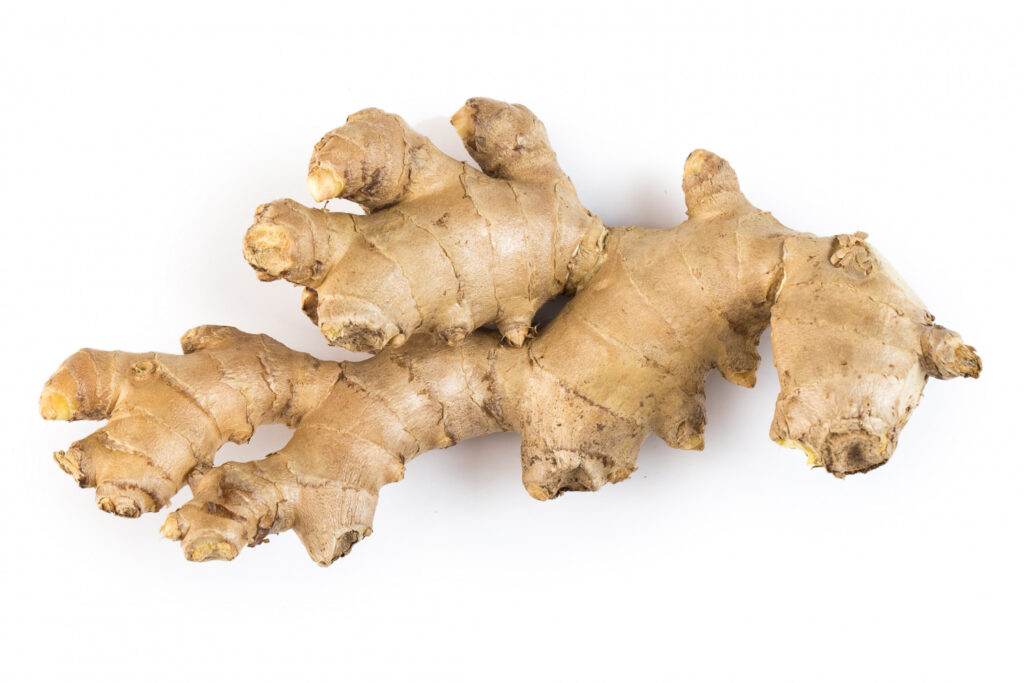
Due to its antibacterial and antiviral properties, ginger is a go-to remedy for colds, coughs, and flu.
- Traditional remedy: Boil a piece of ginger with turmeric, jeera, and ajwain to make a soothing tea. This helps reduce lung inflammation and strengthens immunity.
Ginger can lower blood sugar levels, making it helpful for people managing diabetes. However, if you’re on diabetes medication, keep an eye on your blood sugar levels to avoid hypoglycemia.
- Pro tip: Try having a bit of ginger with your meals to help control post-meal blood sugar spikes.
Ginger is also effective for menstrual cramps. Drinking ginger tea or adding it to your meals during your cycle can reduce discomfort and inflammation.
- Quick recipe: Boil a small piece of ginger in water, add a dash of cinnamon, and sip during your period to alleviate pain.
For more health benefits, check this out: From Nausea and Brain Health to Cancer: 11 Benefits of the Almighty Ginger.
Clove
Cloves, or Syzygium aromaticum, might look like a simple dried flower, but this humble spice packs a punch when it comes to health benefits.
Here’s why clove should be one of the spices to add to your daily diet:
1. Cancer-fighting properties
Scientific research highlights the cancer-fighting potential of cloves, thanks to a compound called eugenol. (Liu, H., Schmitz, J. C., et al, (2014). Clove extract inhibits tumor growth and promotes cell cycle arrest and apoptosis. Oncology research, 21(5), 247–259.)
- Eugenol has been shown to reduce tumor size, stop cancer cell spread, and promote apoptosis (the natural death of unhealthy cells). While cloves aren’t a cure, they can help manage cancer and contribute to its prevention.
2. Rich in antioxidants
Cloves are a powerhouse of antioxidants, essential for combating inflammation and neutralizing free radicals. Chronic inflammation is linked to several conditions, including cancer, diabetes, and heart disease. By adding cloves to your meals, you help reduce inflammation and support overall health.
3. Gut health and antibacterial power
Cloves are highly antibacterial and can help restore balance in your gut microbiome by killing harmful bacteria. This is especially helpful for those with bloating, indigestion, or other digestive issues. Unlike antibiotics that can destroy good bacteria, cloves target bad bacteria without harming your gut flora.
4. Blood sugar regulation
Eating cloves after meals may help regulate blood sugar levels. A common practice in some cultures is chewing on a clove after meals to freshen the breath and support healthy blood sugar levels.
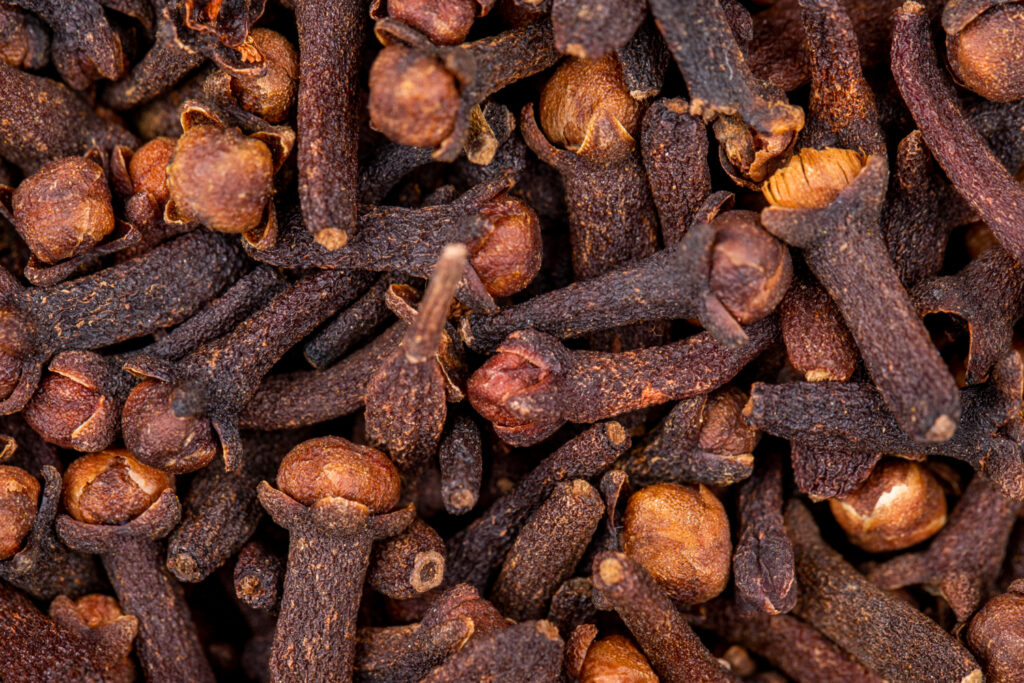
5. Oral health
Cloves have been used for centuries as a natural remedy for toothaches. Their antiseptic properties make them ideal for combating bad breath and promoting oral health. You can chew a clove or use clove oil for pain relief.
6. Skin, hair, and bone health
With its antifungal, antibacterial, and nutrient-rich profile, clove is a versatile beauty and wellness aid:
- Anti-acne: Cloves’ antibacterial properties help combat acne-causing bacteria.
- Hair health: Eugenol also boosts blood circulation to the scalp, supporting hair growth and reducing hair fall.
- Bone strength: Cloves contain manganese, a mineral essential for bone health. Regularly consuming cloves can help maintain bone density and joint health as you age.
How to use cloves:
- Add powdered cloves to teas, curries, rice, and soups for flavor and health benefits.
- Chew on a couple of cloves after meals for better digestion and blood sugar regulation.
- Use clove oil under supervision, as it can be potent and may affect the liver if misused.
Whether you’re managing health conditions or simply looking to boost your wellness, cloves can offer multiple benefits with just a pinch.
Garlic
Garlic contains an amino acid called alliin, which, when crushed or chopped, combines with the enzyme alliinase to form allicin. Allicin is the key compound responsible for garlic’s impressive health benefits, from heart health to immunity.
1. Heart health
Allicin in garlic can help reduce cholesterol and triglycerides, supporting overall heart health. It may help lower blood pressure naturally, although those on blood pressure medication should consult their doctor before adding large amounts of garlic.
2. Blood pressure management
Garlic is known to lower blood pressure, making it beneficial for people with hypertension.
- Studies suggest that consuming garlic, along with other heart-healthy spices, in moderation can help stabilize blood pressure levels, potentially reducing the need for medication over time. (Sleiman, C., Daou, R. M., et al, (2024). Garlic and Hypertension: Efficacy, Mechanism of Action, and Clinical Implications. Nutrients, 16(17), 2895.)
3. Diabetes management
Garlic can aid in lowering blood sugar levels, which may be beneficial for managing type 2 diabetes. However, those on blood sugar medications should monitor their levels closely, as garlic may enhance the effects of their medications.
4. Liver health
Allicin’s antioxidant properties may support liver function, which is crucial for detoxification and fat metabolism. For those with fatty liver, incorporating garlic—and other liver-supporting spices—may help support liver health and reduce fat accumulation.
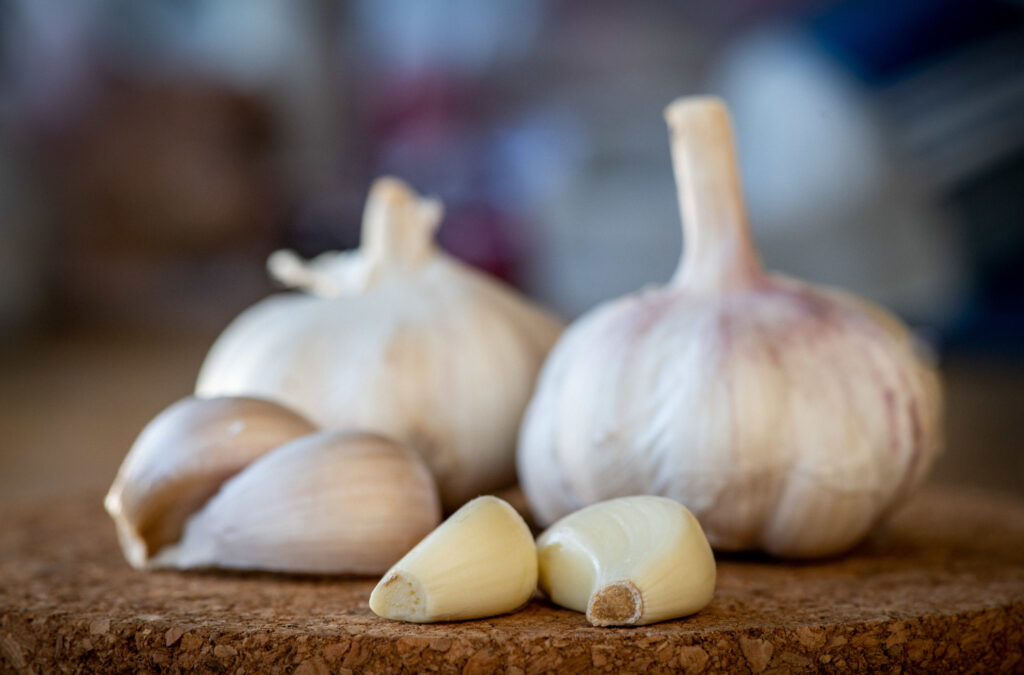
5. Immune support
Garlic is a natural antiseptic, antiviral, and antimicrobial, known to boost immunity. Regular garlic consumption can help with common colds and infections, making it a fantastic addition during flu seasons.
How to consume garlic for maximum benefits?
- Crush or chop garlic and let it sit for 2-4 minutes before consuming. This process activates allicin.
- You can chew or swallow chopped garlic with water, as this is more effective than swallowing whole cloves.
- Add chopped raw garlic to salads or mix it with apple cider vinegar for an extra gut health boost.
Important notes:
- For sensitive stomachs: If raw garlic causes acidity or nausea, try consuming it after a meal.
- Blood-thinning effects: Garlic acts as a natural blood thinner, so those on medications like blood thinners should consult a doctor.
- Before surgery: Avoid garlic if you’re scheduled for surgery, as it may increase bleeding risk.
Whether you add it to your meals or take it raw, a little garlic each day could be just what you need to support your health—naturally!
Cinnamon
Cinnamon’s health benefits stem from its unique blend of bioactive compounds. Here are the main ones:
- Cinnamaldehyde: The primary compound responsible for cinnamon’s distinctive smell and flavor, cinnamaldehyde has antioxidant, anti-inflammatory, and antimicrobial properties.
- Eugenol: Known for its soothing and anesthetic properties, eugenol contributes to cinnamon’s pain-relieving effects.
- Coumarin: A natural blood thinner, coumarin has been linked to improved circulation, although it should be consumed in moderation due to its potential liver effects.
- Polyphenols: Cinnamon is rich in polyphenols, powerful antioxidants that protect cells from oxidative stress and inflammation.
Here are some health benefits of cinnamon:
Adding cinnamon to your diet is an easy way to boost health with spices.
- Helps regulate blood sugar levels: Cinnamaldehyde helps improve insulin sensitivity, allowing cells to process glucose more efficiently.
- Rich in antioxidants: The polyphenols in cinnamon are potent antioxidants that neutralize free radicals and reduce cellular damage.
- Anti-inflammatory properties: Compounds in cinnamon, including cinnamaldehyde and eugenol, help reduce inflammation by blocking the release of certain inflammatory molecules.
- Supports heart health: Cinnamon may lower LDL (bad) cholesterol and triglyceride levels while maintaining HDL (good) cholesterol, contributing to better heart health.
- Potential anti-cancer effects: The antioxidants in cinnamon have been shown to protect DNA from damage and inhibit cancer cell growth. (Caserta, S., Genovese, C., et al, (2023). The Anti-Cancer Effect of Cinnamon Aqueous Extract: A Focus on Hematological Malignancies. Life (Basel, Switzerland), 13(5), 1176.)

A word of caution: Not all cinnamon is created equal. There are two main types of cinnamon:
- Ceylon Cinnamon (True Cinnamon): Known as true cinnamon, Ceylon cinnamon has lower levels of coumarin, making it a better choice for long-term use.
- Cassia Cinnamon: More commonly found in supermarkets, Cassia cinnamon contains higher levels of coumarin, which, when consumed in high amounts, may affect liver health.
So, the next time you reach for cinnamon, remember that you’re adding more than just warmth to your dish—you’re including one of the most beneficial spices for your health.
Black Pepper
While many of us are used to adding salt to our meals, it’s worth swapping that habit for black pepper. Salt can lead to water retention and high blood pressure when overused. Black pepper, on the other hand, brings flavor and health benefits to the table without the risks. It is considered as one of the most powerful spices!
- Boosts digestion: Black pepper promotes the secretion of digestive enzymes, which are essential for breaking down carbs, proteins, and fats. Lack of digestive enzymes can lead to issues such as indigestion, acidity, bloating, and inflammation in the gut.
- Supports gut health: Black pepper is commonly found in Indian cuisine, often blended into curries and spice mixes. This traditional use aligns with modern science: its compounds can positively affect the gut microbiome, helping to maintain a healthy digestive tract.
- Eases headaches and migraines: Black pepper can offer mild relief for headaches and migraines. For a simple remedy, soak 3-4 peppercorns for 5-6 hours, bite into them, and swallow with water. While it’s not a cure-all, many people find this natural remedy helpful.
- Boosts metabolism: Black pepper can slightly increase metabolic rate, making it a popular ingredient in weight-loss teas. Although not a standalone solution for fat loss, black pepper can be a supportive addition to a healthy lifestyle.
- Packed with antioxidants: Rich in antioxidants like vitamin C, vitamin A, and flavonoids, black pepper combats oxidative stress. Antioxidants are vital in protecting cells from damage, supporting everything from immune function to skin health.
- Natural cold remedy: Black pepper’s antibacterial and antifungal properties make it an excellent remedy for colds, coughs, and sore throats. For a simple cold-fighting tea:
– Boil water with a bit of ginger and a dash of black pepper.
– Remove from heat, then add a spoonful of raw, unpasteurized honey (to avoid losing its benefits). - Traditional wellness teas: Black pepper pairs well with spices like ginger, tulsi, and cinnamon. In traditional masala chai, black pepper was once an essential ingredient, contributing both flavor and health benefits. Try making your tea blends by adding a dash of black pepper for a warming, metabolism-boosting twist.
- Relieves respiratory congestion: Traditional Indian recipes like rasam and sambar, which often include black pepper, can help break down mucus and ease congestion. When consumed, they prompt a runny nose, helping to clear the airways.
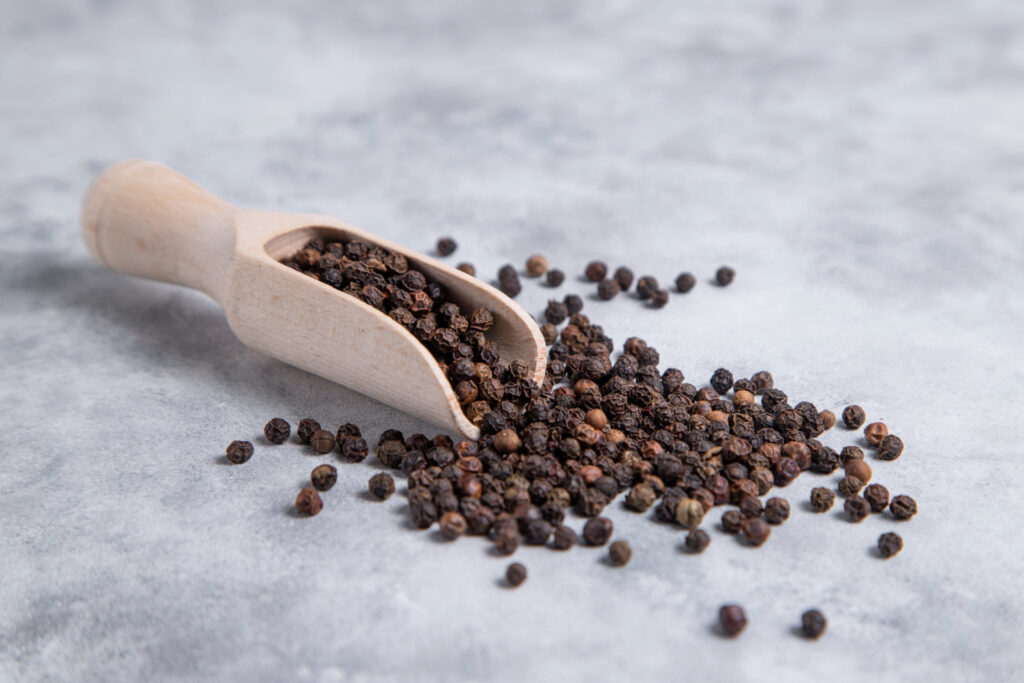
Using the powerful combo of turmeric and black pepper:
Black pepper contains an active compound called piperine, which significantly enhances the absorption of curcumin, the main active ingredient in turmeric. Curcumin is a potent anti-inflammatory and antioxidant, but it isn’t well absorbed on its own.
- When paired with black pepper, however, curcumin’s bioavailability increases by up to 2000%. (Hewlings, S. J., & Kalman, D. S. (2017). Curcumin: A Review of Its Effects on Human Health. Foods (Basel, Switzerland), 6(10), 92.)
Here’s how to optimize the absorption of turmeric in your diet:
- Add black pepper: Sprinkle freshly ground black pepper on turmeric dishes or drinks to maximize curcumin absorption.
- Combine with healthy fats: Curcumin is fat-soluble, so pairing turmeric and black pepper with a healthy fat like ghee or coconut oil further enhances absorption.
- Try simple recipes: For an immune-boosting mix, combine a teaspoon of ghee with turmeric and black pepper. This blend is excellent for digestion, inflammation, and even skin health.
While black pepper is beneficial, moderation is key. It’s best to avoid adding excessive amounts to your diet.
Cardamom
Cardamom, also known as elaichi in India, is one of the most versatile spices packed with surprising health benefits. This spice has been traditionally used in culinary dishes and holistic medicine across the globe, from Ayurveda to Middle Eastern coffee blends.
Here’s how cardamom can help with specific issues:
1. Digestive health: Cardamom has a long history of aiding digestion. It’s highly alkaline, helping to balance the body’s pH and reduce acidity, which is especially beneficial for people who experience frequent indigestion, bloating, or acid reflux.
- Chewing cardamom post-meal or adding it to your tea can aid digestion. This practice is particularly common in Ayurveda, where sucking on a cardamom pod is recommended after heavy meals to reduce acidity and improve digestive health.
- It reduces gas and bloating by enhancing digestive juices, which helps alleviate that uncomfortable, full feeling after a meal.
2. Anti-Inflammatory effects: Cardamom is rich in antioxidants that combat inflammation, a root cause of many chronic illnesses like heart disease and diabetes.
3. Anti-aging benefits: Cardamom’s antioxidant properties combat inflammation, which is linked to faster aging. By managing acidity and promoting a balanced internal environment, this is one of the major spices that can support graceful aging from the inside out.
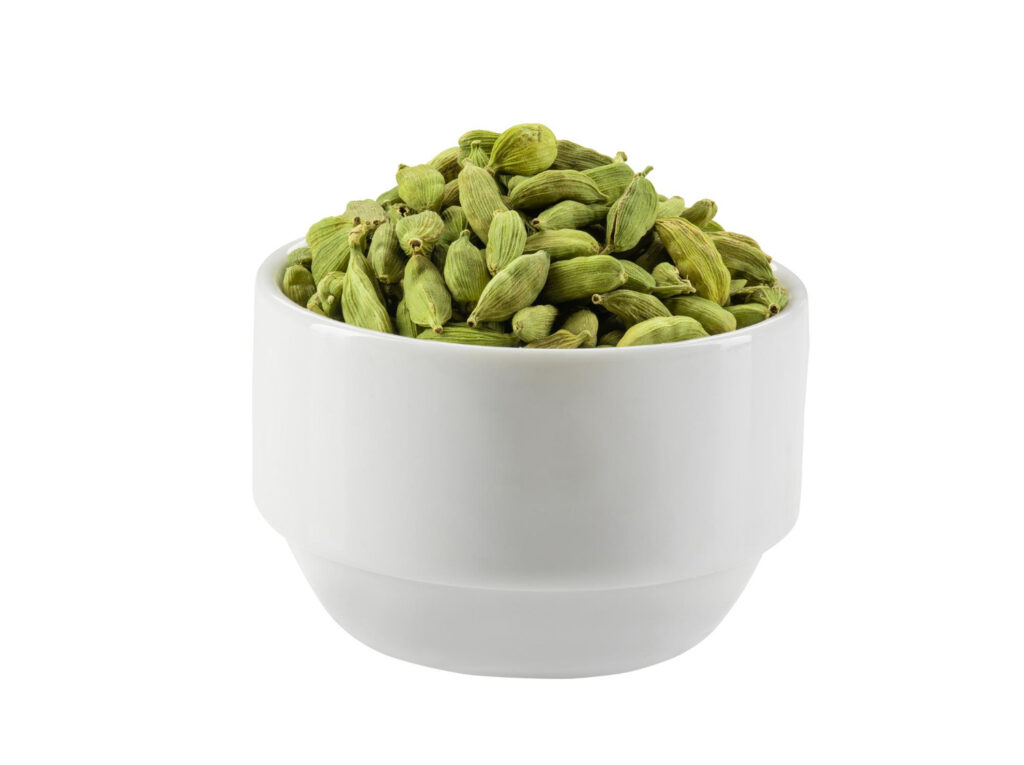
4. Supports respiratory health: Cardamom breaks down mucus in the respiratory system, which can improve lung function and ease breathing. This effect is crucial for individuals exposed to pollution or experiencing seasonal respiratory issues.
- Tip: Add a bit of cardamom to your morning tea to help clear respiratory pathways and keep your lungs healthier.
5. Natural cleanse: Cardamom aids in cleansing the liver, kidneys, and digestive tract, making it a simple but powerful daily addition for those seeking natural detoxification methods.
- Concoction: Boil cardamom pods with ginger and cumin seeds for a refreshing detox tea that supports the body’s natural cleansing processes.
6. Helps with constipation: The oils in cardamom assist food in moving smoothly through the intestines, making it a gentle remedy for constipation.
- Remedy: A cardamom tea before bedtime may help improve digestion and reduce constipation.
Although cardamom is generally safe, here are a few considerations:
- Allergies: Some individuals may be allergic to cardamom. Start with a small amount to ensure no adverse reaction.
- Gallstones: For those with large gallstones, excessive cardamom is not recommended, as it can stimulate bile production.
- Medication interactions: People on medications for HIV, antidepressants, or blood thinners should consult their healthcare provider before adding cardamom in large quantities.
So, next time you brew your tea or prepare a meal, consider adding a little cardamom and enjoy both the taste and health benefits it brings to the table. Adding spices like cardamom can be an easy way to boost flavor and health naturally!
The Last Word
From reducing inflammation to boosting immunity and even promoting cellular health, these powerful spices are nature’s gift to our overall wellness.
Why not start by adding a little turmeric to your morning tea or sprinkling cinnamon into your oatmeal? Take the first step toward a healthier, stronger you by embracing these age-old spices, backed by modern science.
Your body will thank YOU!
Disclaimer: The information provided in this blog is for educational purposes only and is not intended as medical advice. Always consult with a healthcare professional before making any changes to your nutrition, supplements, or lifestyle, particularly if you are pregnant, nursing, have a medical condition or are taking medication.
Want personalized advice on how to incorporate these healing spices into your routine?
Set up a one-on-one consultation with our integrative team to optimize your nutrition goals.
Reach out to us at 1800 102 0253 or write to us at [email protected].
Team Luke
Start Your Wellness Journey
Feeling inspired to take the next step in your wellness journey? Connect with us to explore how our tailored programs can support your health journey. Your transformation is just a conversation away.



